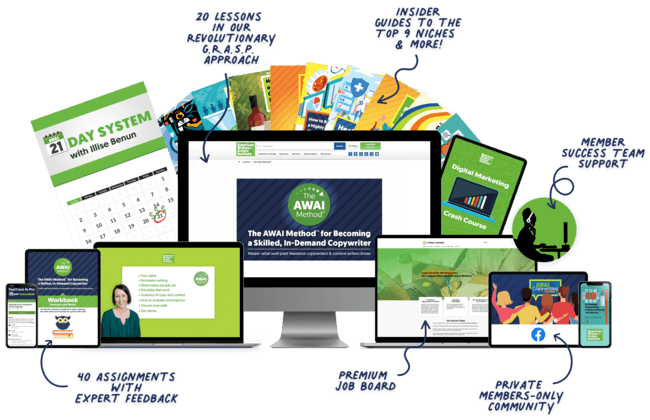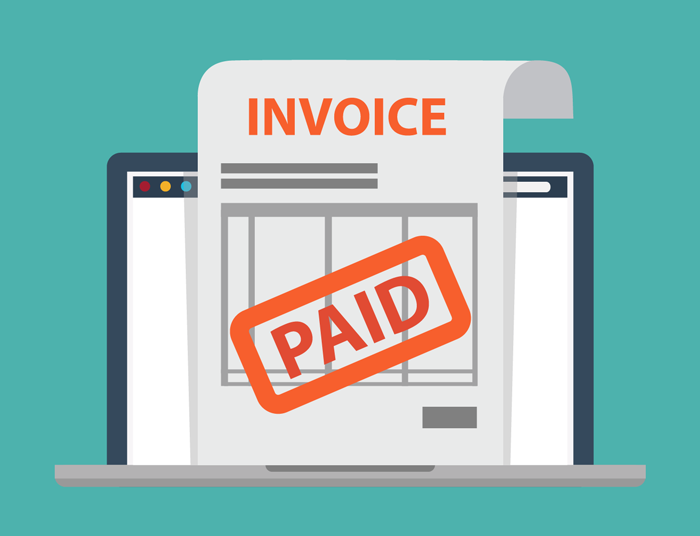
How to Become a Copywriter: 7 Steps for Starting a Copywriting Career in 2025
Are you thinking about how to become a copywriter – or if it’s a smart career move for you?
In our two+ decades of working as professional copywriters, teaching others, and supporting a growing community of freelance writers – the demand for skilled copywriters continues to grow.
In fact, it’s soaring more than ever.
If you’re starting to think seriously about getting into copywriting, we’ve compiled a list of seven critical steps nearly all successful copywriters have taken to reach the top of their fields.
But first, here’s a primer on what copywriting is and what to expect when you take action on your goal of becoming a copywriter.
What is a Copywriter?
With the increase in people wanting to work from home or live the writer’s life, many are asking what is a copywriter?
A copywriter has learned the necessary skills to create persuasive copy businesses want and need to engage with readers through marketing and promotional materials.
Types of Copywriting
When it comes to types of copywriting, you have a long list to choose from. Copywriting has many types of niches and specialties you can specialize in.
Here are a few examples:
- Business-to-Consumer (B2C)
- Business-to-Business (B2B)
- SEO
- Direct-Response
- Social Media
Since copywriting is the art of crafting compelling content for businesses to market products, you need to decide if you want to write more “salesy” copy or if you’d prefer creating more information-based content.
You can read more about the types of copywriting to find out which one is the best fit for you.
How Much Do Copywriters Make?
Copywriter salaries vary depending on a number of factors, such as if you work part- or full-time, your location, experience level, and specialty or niche focus.
Taking everything into consideration, you need to determine what your income goals are. Once you have an idea in mind, you can take the steps necessary to reach it.
Average copywriter salaries based on data from Salary.com:
- Copywriter (annual) – $48,425 to $60,366
- Freelancer Copywriter (annual) – $43,685 to $66,436
- Copywriter and Freelancer copywriter (hourly) – $21 to $32
Keep in mind these salaries are based on averages and can be a lot higher. You can learn more about how much copywriters make to see if copywriting is the career path for you.
Step 1. Learn the Basics of Copywriting
This may be repeating the obvious.
But the core principles of good copy are the same no matter what type of copywriting you decide to write.
Whether it’s B2C, B2B, direct response, content marketing, or any of the other options open to you as a copywriter, your copy will continue to improve the more you study and practice the craft of copywriting.
You can get the basics down in a fairly short time by taking a course on copywriting fundamentals, such as The AWAI Method™ for Becoming a Skilled, In-Demand Copywriter. It’s known as the “gold-standard” in the industry, and the strategies you’ll learn are the same ones used by all of the highest-earning copywriters today.
Reading copywriting classics is also an excellent way to get up to speed on everything to do with copywriting. You’ll find yourself referring to these books over and over again as you progress through your career.
Sandy Franks, the copy chief at AWAI, recommends that every copywriter’s bookshelf should contain the following titles:
- Cash Copy, by Dr. Jeffrey Lang
- Ogilvy on Advertising, by David Ogilvy
- Great Leads, by Michael Masterson and John Forde
- The Copywriter’s Handbook, by Robert Bly
- Sales Letters that Sizzle, by Herschell Gordon Lewis
There are many more excellent books and resources on copywriting, both in print and online.
But the most important thing is to use the resources available to you. Make a plan of which books and courses you want to go through. Then, follow through with your plan and take the time to read and study all of the material, preferably a few times.
You’ll need to continue this habit throughout your entire copywriting career. All successful copywriters are committed to ongoing learning and regularly invest a portion of their time and money into advancing their skills and knowledge of copywriting.
Step 2. Get the Right Mindset
It’s critical you believe in yourself and what you can achieve as a copywriter.
If you don’t get your mindset right from the start, you’re destined to fail.
You’ve likely heard this statement from countless success coaches and motivational speakers before, but they keep repeating it because it’s true!
Copywriting success doesn’t happen overnight. You’ll need to work at it for a while before you start getting off the ground.
But if you believe on a deeper level that you can become a successful copywriter, this belief will be the fuel that powers you through the ups and downs you’re bound to experience as you build your career.
“Success is a process, not an event.” — Gary Halbert
Ultrarunner Ray Zahab is famous for running unbelievable distances through some of the most extreme conditions on the planet. In one amazing journey, he ran across the Sahara Desert in 111 days, covering 4660 miles (7,500 km) of very challenging terrain.
Ray has often been asked how he can endure such extreme journeys. In response, Ray says, “The challenge of ultrarunning is 90 percent mental, and the other 10 percent is all in our heads.”
The same is true for establishing a copywriting career or achieving any other important goal in life.
It’s all about what’s in your head.
Any self-doubt, negative self-talk, or other “mind trash” are the only things that will hold you back from achieving what you want.
How can you overcome mind trash? Mindy McHorse spoke to Dan Kennedy about this exact topic and shared some great insights in her article on how to eradicate your mind trash.
How to Become a Successful, Well-Paid Copywriter In 2025… What You Need, What You Don’t… and the Enormous Opportunity That Awaits You!
Enroll in our FREE 5-part “Be a Copywriter” video training series to learn how to get started as an in-demand “Thrive-from-Anywhere” Copywriter
— Enter Your Info for IMMEDIATE Access —
PLUS receive our FREE daily newsletter, The Writer’s Life, packed with powerful insights, strategies, and expert advice on how to make a great living through writing.
By providing your email today, you’re giving consent for us to contact you by email. We do not sell your personal information to other companies, and you can withdraw consent at any time. By submitting this form, you agree to our Privacy Policy.
Step 3. Choose a Niche
You’ve likely heard the expression that someone has really found their niche in life.
In other words, they’ve found a situation that perfectly fits their individual talents, interests, and needs.
That’s what we mean by saying you need to choose your niche in copywriting. You need to find a situation that’s the best fit for you.
Your niche can usually refer to one of two things:
- A specific industry or market you write for
- A specific type of copy you specialize in writing
A niche market refers to a specific industry or segment within an industry. Some examples of niche markets include renewable energy, baby products, SAAS technology, health and nutrition, travel, or real estate.
The second possibility for a niche is to specialize in writing one specific type of copy, such as case studies, emails, or sales letters.
Why should you choose a niche?
In short, because it increases your value as a copywriter.
By specializing in a niche, you’re viewed as an expert in your field. And companies will pay more for an expert than they would for a general copywriter.
Specializing in a niche makes it easier to find high-paying work, and more importantly, work that you enjoy.
How do you choose the best niche for you?
We give you all the details in our free Inside AWAI webinar on the easiest way to choose a copywriting niche.
You can also get more information on some of today’s hottest niches in our article on picking the right niche to land well-paid copywriting jobs.
Step 4. Get to Know Your Industry and Offer What They Want
Once you’ve determined the niche you want to specialize in, the next step is to learn as much as you can about the industry.
For example, if you want to write for the financial industry, subscribe to a few financial newsletters, or buy other products you’d like to help promote. Go to industry events and seminars. Read books about investing and finance.
And while you’re becoming familiar with the industry, pay close attention to all the advertising copy you receive, both in print and email. This will show you the types of copywriting the industry uses, which are the exact types of copy you’ll need to know how to write.

Step 5. Find Your Tribe
This is another secret of copywriting success that’s easily ignored.
No successful copywriters have made their journey alone. They’ve done it with the help of others.
The value of staying connected to other copywriters is immeasurable.
No matter where you’re at in your copywriting career, no one understands what you’re going through better than other copywriters.
“Making a difference in your work is not about productivity; it’s about people. When you focus on others and connect with them, you can work together to accomplish great things.”
— John C. Maxwell,
speaker and author on leadership
They can provide the support you need to make it through the difficult times, and celebrate with you when you succeed.
Many copywriters have developed life-long friendships within the copywriting community. And these relationships will only improve and strengthen both your career and your enjoyment of life.
These are just a few ways you can reach out and connect with other copywriters:
- Join a critique group, either online or in person
- Go to copywriting seminars and events
- Join a copywriting mastermind group
- Participate in online copywriting forums
- Start a local copywriting group of your own through Meetup.com
You can also keep up-to-date on all the latest developments in the copywriting industry by subscribing to industry newsletters, such as our free newsletter, The Writer’s Life.
Connecting with other copywriters also has many practical benefits.
Having your work critiqued by other copywriters, as well as critiquing theirs, is a tried-and-true way to improve the quality of your writing.
Setting up an accountability partnership with another copywriter, or an accountability group, is another proven way to help everyone improve their copywriting skills and meet their career goals.
A study by The American Society of Training and Development (ASTD) found that you have a 65% chance of completing a goal if you commit to someone, which is already pretty good.
But your chance of achieving that goal jumps to 95% if you have a specific appointment with an accountability partner where you have to report on your progress.
There’s no benefit in trying to “go it alone” as a copywriter. Reach out to the copywriting community and get involved. It’s one of the best investments you can make in your future as a copywriter.
Step 6. Determine How You’re Going to Market Yourself
In the basics of copywriting, we discussed how a USP is a short summary of why a product or service is unique.
A USP is important when writing sales copy for a company’s product, but it’s just as important when you’re trying to sell your own services.
Once you’ve decided which types of companies you want to write for, and found out what types of copy they use, you’re ready to craft your USP.
Consider the skills you have that these companies need, or the skills you’re going to have. What benefits can you offer a company as a copywriter? And how do these benefits make you stand out from the competition?
Pull your answers to these questions together into a sentence that looks something like:
I help (your industry) companies to write (your type of copywriting) that (your unique benefit).
For example, I help home restoration companies write engaging web content that helps generate new leads.
Once you’re clear on who you’re targeting and what you can offer them, everything else falls into place.
Next, consider what types of marketing you would be comfortable with.
If you’re an introvert, you might want to approach potential clients through email or LinkedIn. But if you’re an extrovert, you may prefer cold calling prospective clients or giving public talks to promote yourself.
Regardless of your personality, our program called Your No-Stress Method for Getting Clients: 26 Field-Tested Strategies for Introverts, Extroverts, and Everyone In-Between can help you plan a marketing strategy that will work for you.
Step 7. Master Your Time
Copywriting legend Dan Kennedy has said the reason he’s one of the highest-paid copywriters working today is not because he’s the “best,” but because he’s the fastest and can do the most projects.
Especially if you’re a freelance copywriter, learning how to be as efficient as possible in your work and business operations is vital.
This won’t happen in a day, or even in a year. It’s an ongoing process that will evolve with your career as you learn the types of copywriting that suit you best, how to write them, and how to market yourself.
Every copywriter has a unique way of organizing their day and managing their time that works best for them.
Some copywriters find they’re most productive first thing in the morning. So, they structure their days to get up early and get their writing done by noon. Then they either take the rest of the day off, or do less-intensive work tasks, such as following up with emails or doing some research.
On the other hand, you may work better later in the day. So, you might want to do the bulk of your work in the afternoon and leave your mornings open for personal time.
The only way you’ll find a system that works well for you is to experiment with different techniques.
A couple of excellent books on productivity and time management are Getting Things Done, by David Allen, and Atomic Habits, by James Clear.
In this article, Heather Robson shares how to have a successful at-home workday.
Roy Furr also has some helpful suggestions on easy time management for copywriters.
Summary
The path to becoming a professional copywriter looks different for everyone.
But following the steps other successful copywriters have taken before you will accelerate your own success and keep you on track.
To get started mapping out the steps needed to achieve your own version of copywriting success, check out our Inside AWAI webinar Creating Your Own Personal Roadmap to a Well-Paid Writing Career.
The AWAI Method™ for Becoming a Skilled, In-Demand Copywriter

Everything you need to start getting paid to write:
- Hands-on training…
- Assignments with feedback…
- A portfolio of five professional samples…
- Help landing well-paying clients…
- And more!





